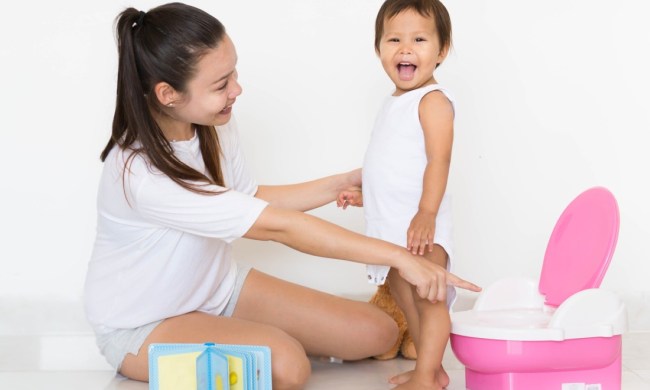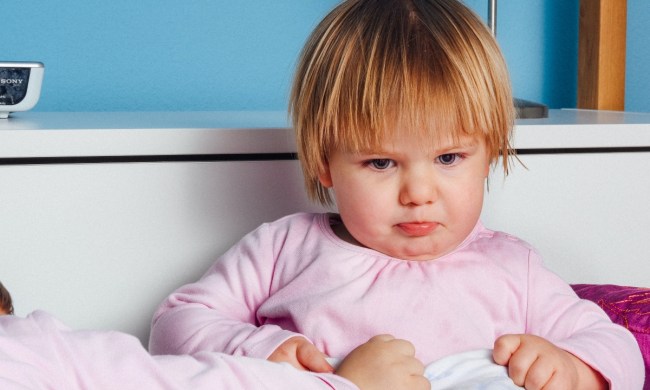Many kids drink their water from plastic sippy cups, but is a stainless steel water bottle a better option?
It may be more eco-friendly, non-toxic, and durable to have a stainless steel water bottle, but also consider the weight if your child drops it on to their little toes. The good news is, you can get a water bottle cozy to cover it and make it easier to grip while also making it softer if it falls.
Plastics and metals both have some risks of their materials seeping into the water your toddler drinks, but high-quality stainless steel has perhaps the lowest risk of all. A key advantage of stainless steel is that it doesn’t contain BPA or other harmful chemicals that some plastics do. It also keeps drinks cooler longer for those beach days.
R. Thomas Zoeller, a professor at the University of Massachusetts at Amherst, who has studied the chemical effects of BPA, told the Washington Post he recommends metal bottles over plastic ones: “Generally, I feel more comfortable with glass than plastic, but I think stainless steel has a lot to offer in terms of not having things leach into the water.” He also said to make sure your metal water bottle isn’t lined with plastic, epoxy, or resin “because of concerns that those materials could contain harmful chemicals.” However, stainless steel is a metal that doesn’t require a lining like aluminum does, so this shouldn’t be a problem.
To make sure your kid’s stainless steel water bottle doesn’t have lead, look for #304 or 18/8 food-grade stainless steel. This means it’s FDA-approved and the safest for kids.
Ready to ditch plastic for stainless steel? Here are our top choices for stainless steel water bottles for toddlers.
CamelBak Eddy+ Kids 12 oz Bottle
This sweat-proof stainless steel water bottle for toddlers is an adorable, safe, and practical option. It’s leak-proof when closed and spill-proof when open, and it’s made of that 18/8 stainless steel you’re looking for. Unlike typical adult stainless steel water bottles, this one for kids has a sippy spout for drinking and a comfy handle for carrying. Choose from a classic steel look or one of four creative designs (camping foxes, flowerchild sloth, rainbow love, or UFOs).
CamelBak Eddy+ Kids 14 oz Bottle
Looking for a little more volume for a bigger kid? Choose the same bottle like the one above but in 14 ounces instead of 12 ounces. This one gives you different design choices, too: plain steel, cars & trucks, cats & dogs, dino bones, or unicorn & blooms. Kids will love the design that best suits them.
Ello Emma Vacuum Insulated Stainless Steel Kids Water Bottle with Anti-Microbial Straw
This 18/8 stainless steel water bottle comes in blue or pink and has a flip lid that can be opened with one touch. The lid keeps the entire drinking surface covered, so nothing gets on the sippy straw while it’s in a backpack, lunch box, or diaper bag. The soft straw is made of BPA-free antimicrobial material that inhibits bacterial growth. The lid is dishwasher-safe so that you can sterilize the drinking area, but you should hand-wash the bottle itself. This vacuum-insulated bottle keeps drinks cold for up to 14+ hours!
Linkit Kids Water Bottle – Stainless Steel Vacuum Insulated Thermos
If your toddler doesn’t want to use a straw and you are looking to avoid plastic altogether, this food-grade 304 18/8 stainless steel kids water bottle is the best choice. With a simple opening, just like adult stainless steel bottles, this one comes in various sizes and colors to match your child’s personality. You can choose 9, 12, 17, or even 25-ounce sizes. Sweat-free, leak-proof, and vacuum-insulated to keep drinks cold for up to 24 hours, this stainless steel water bottle will make toddlers feel like big kids.
Mira Insulated Small Thermos Flask
In yellow, blue, or pink, this small stainless steel water bottle is a good fit for toddlers, holding either seven or 10 ounces. It’s made of 18/8 food-grade stainless steel and has a powder-coated outer finish for insulation that keeps drinks cold for eight hours and prevents condensation on the exterior, so nothing next to it gets soggy, and it doesn’t slip when held. Leak-proof, sweat-free, phthalate-free, and BPA-free, toddler hands easily grip this bottle.
Looking for more? Check out our list of important daily routines for toddlers.



